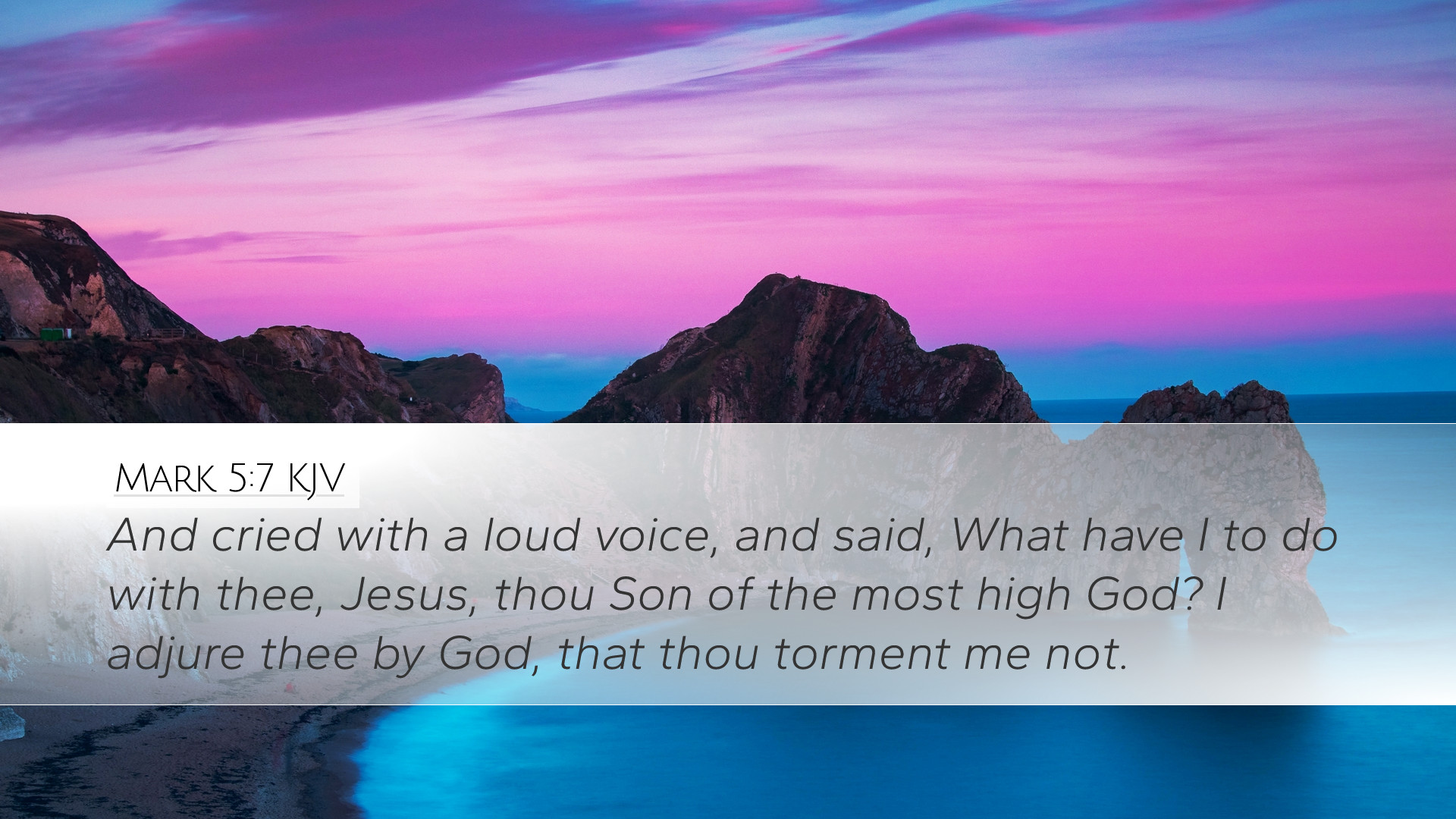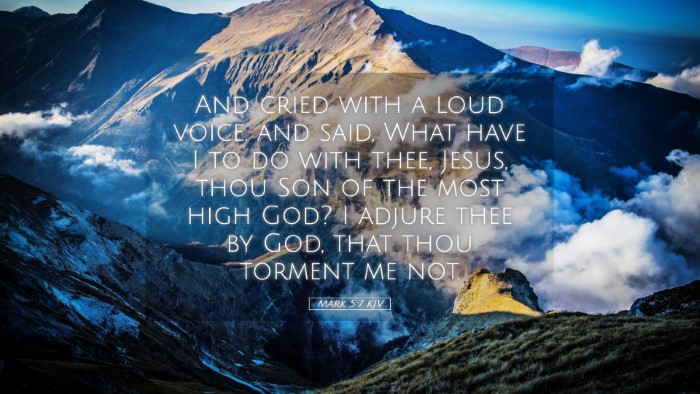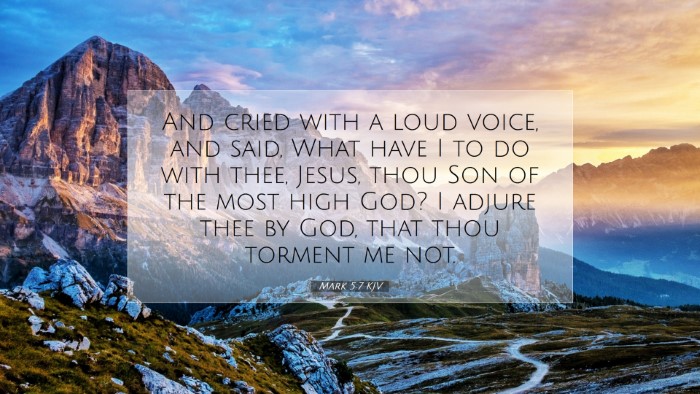Commentary on Mark 5:7
Bible Verse: "And he cried with a loud voice, and said, What have I to do with thee, Jesus, thou Son of the most high God? I adjure thee by God, that thou torment me not." (Mark 5:7)
Introduction
This verse occurs in a profound narrative where Jesus encounters a man possessed by unclean spirits. Mark 5:7 reveals the depths of this man's torment and the recognition of Jesus's divine authority by the demons within him. Several public domain commentaries provide insights into the implications of this encounter, emphasizing the themes of identity, authority, and the cosmic battle between good and evil.
Contextual Background
In this passage, we find Jesus crossing over to the region of the Gadarenes, where he confronts a man tormented by demons. The context highlights not only the spiritual condition of the individual but also the broader implications of Jesus's mission to bring deliverance to those bound by sin and darkness.
Matthew Henry's Insight
Matthew Henry highlights that this moment signifies the recognition of Christ's authority even by the powers of darkness. The demon's plea illustrates an understanding that Jesus is the Son of the Most High God. Henry notes that this acknowledgment is crucial, as it foreshadows the ultimate victory of Christ over evil. Furthermore, he remarks on the desperation of the demon's request — indicative of their fear of divine judgment and torment.
Albert Barnes's Analysis
Albert Barnes provides a theological perspective on the fear exhibited by the demons. He asserts that the cry of the man indicates a profound agony and awareness of the presence of a higher power. Barnes expounds on the phrase "I adjure thee by God," suggesting that even the demons recognize a divine authority greater than themselves. This aligns with the biblical narrative where Jesus commands unclean spirits and they must obey Him, emphasizing His sovereign power.
Adam Clarke's Commentary
Adam Clarke delves into the language used in the verse. He notes that the statement "What have I to do with thee?" denotes a conflict or an adversarial relationship. Clarke infers that the demon recognizes Jesus not only as a threat but also as a being of immense superiority. This confrontation serves as a stark reminder of the ongoing spiritual warfare. Clarke interprets the adjuration as a last desperate attempt by the demon to negotiate its fate, highlighting the tension in the spiritual realm.
Theological Implications
The verse encapsulates several theological themes crucial for understanding the nature of Christ and His ministry:
- Recognition of Jesus's Divinity: The acknowledgment of Jesus as the "Son of the Most High God" emphasizes Christ's divine nature and authority over spiritual beings. This is significant in affirming the belief in the dual nature of Christ as both fully divine and fully human.
- Fear of Judgment: The demons' fear of torment illustrates the inevitable judgment that awaits evil entities. This reflects the broader biblical theme of judgment for sin and unclean spirits, reinforcing the necessity for Jesus's redemptive work.
- The Power of Christ's Name: The act of adjuring Jesus by God demonstrates the weight of His name even in the spiritual realm. This can encourage believers to rely on the name of Jesus in spiritual battles, affirming the belief that His name is above all names.
- Spiritual Warfare: This encounter sheds light on the nature of spiritual warfare. The visible confrontation between Jesus and the demon-filled man symbolizes the ongoing struggle between light and darkness, a vital touchpoint for pastors and theologians when considering the spiritual state of humanity.
Practical Applications
The insights drawn from Mark 5:7 can yield practical applications for pastors and students of theology:
- Preaching about Jesus’s Authority: Sermons can emphasize the authority of Christ over demonic forces, encouraging congregations to trust in His power during times of struggle.
- Understanding Spiritual Struggles: Pastors can use this narrative to help congregations better understand their own spiritual battles, enabling them to find hope in Christ's power over darkness.
- Encouragement for the Tormented: For those experiencing spiritual or mental anguish, this passage serves as a reminder that Jesus is willing and able to bring deliverance and healing.
- Equipping Believers: Teaching on the importance of relying on the name of Jesus in prayer and spiritual warfare can empower believers to stand firm against the challenges they face.
Conclusion
Mark 5:7 unveils a powerful encounter that reveals both the identity of Jesus and the reality of unseen spiritual battles. Insights from public domain commentaries enrich our understanding of this verse, allowing pastors, students, theologians, and Bible scholars to appreciate the depth of its meaning. The acknowledgment of Jesus's authority by the demons underscores a central tenet of the Gospel: that through Christ, victory over any form of oppression is assured.


